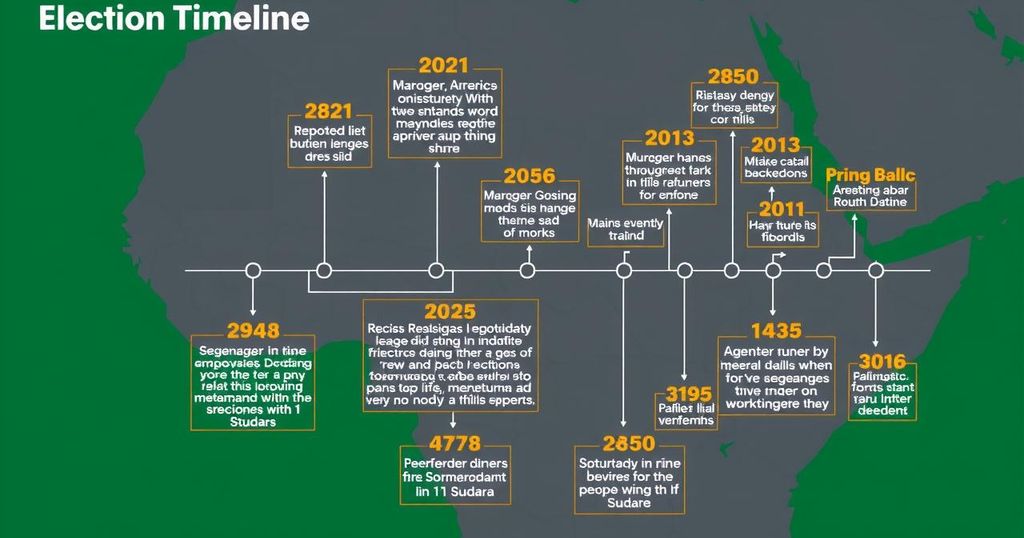South Sudan’s Election Postponement: A Call for Urgent Action
The UN has expressed concern over South Sudan’s decision to postpone elections until December 2026, extending the transition period to February 2027. This delay exacerbates frustrations among citizens longing for democratic governance. UN officials urge political leaders to prioritize implementing the peace agreement and essential benchmarks to foster stability and democracy amid ongoing violence and humanitarian challenges.
The decision to postpone the much-anticipated elections in South Sudan until December 2026 has drawn significant concern from the international community. UN Special Representative Nicholas Haysom described this extension, which delays the transition period until February 2027, as a ‘regrettable development.’ Indeed, this outcome reflects the frustration of South Sudan’s citizens who have long awaited democratic progress amid ongoing political stagnation. Since gaining independence in 2011, South Sudan has faced considerable turmoil. Following a violent conflict that erupted in 2013 between President Salva Kiir and Vice-President Riek Machar, the 2018 Revitalized Peace Agreement aimed to restore stability. However, the recent announcement to shift the electoral timeline signifies continued challenges in executing the peace accord and fostering a democratic transition. Haysom highlighted the need for political leaders to seek compromises to advance the implementation of the peace agreement. Despite intensive discussions with various stakeholders, including civil society and international partners, he noted that actual progress has stalled due to competing political interests. Haysom emphasized that the urgency to implement key benchmarks, such as the deployment of unified forces and preparations for voter registration, must remain a priority. Moreover, he warned that the current period should not reflect ‘business as usual.’ He stated that the timeline for the transition starts now, cautioning against repeating delays that have characterized the recent past. UNMISS has identified six actionable steps to kickstart this process, and the organization is committed to collaborating with civil society to enhance civic education and electoral participation. In addition to electoral concerns, Haysom reported increased local violence, exacerbated by the end of the rainy season. Humanitarian challenges continue as South Sudan faces the staggering influx of over 830,000 refugees since the outbreak of conflict in neighboring Sudan. With limited funding for aid initiatives, these compounding issues stress the urgent need for comprehensive actions to support recovery and stability in the region. The implications of these developments are profound. The delays in elections not only affect the political landscape but also raise concerns about the civil rights and aspirations of the South Sudanese populace, who yearn for lasting peace and effective governance. The commitment of both the South Sudanese leadership and the international community is crucial to ensuring that the forthcoming elections become a reality, fostering a new chapter of democratic participation in the world’s youngest nation.
South Sudan, which gained independence from Sudan in 2011, has been haunted by violence and political conflict since its formation. A civil war erupted in 2013, leading to significant loss of life and displacement. The 2018 Revitalized Peace Agreement aimed to rectify the ongoing strife, establishing a framework for peace and eventual democratic elections. However, continued political discord and delays have thwarted progress, culminating in repeated extensions of the transitional government. The urgency for elections reflects the desire of South Sudanese citizens for democratic governance after years of instability.
In summary, the postponement of elections in South Sudan until December 2026 has sparked considerable concern among both the local population and the international community. UN representatives have emphasized the necessity for South Sudan’s leadership to accelerate their efforts to fulfill the conditions of the peace agreement. Moving forward, prompt action is essential to establish a functioning democracy that can cater to the needs and aspirations of the South Sudanese people, ensuring that this extension is indeed the last.
Original Source: news.un.org




Post Comment